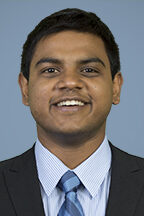FR8relay has received a nearly $256,000 Small Business Innovation Research Phase I award from the National Science Foundation.
The Bentonville-based company is developing software that pools shipments and matches truck drivers with trailers and cargo in a relay model. This innovative approach ensures equipment and freight keep moving while returning long-haul drivers home daily.
The NSF project aims to prove the feasibility of FR8relay’s machine learning techniques in building a predictive tool for relay scheduling within a dynamic trucking industry.
The FR8relay team previously won SBIR Phase I and II awards from the U.S. Department of Agriculture in 2021 and 2022, and a Phase I from the Department of Energy in 2022.

A Test for Machine Learning
While FR8relay’s DOE and USDA projects focus on customer and stakeholder identification and live implementation of relay trucking, respectively, the new NSF project seeks to validate a key component of the software: the use of machine learning to make accurate predictions.
“This project will leverage real-world proprietary operational data from large trucking companies, combined with public data sources and drivers and equipment data informed by work with local partners at relay nodes,” CEO Aayush Thakur said.
While the use of machine learning has been explored in predicting weather and traffic events, no such tools are known to exist that can be utilized for this patented relay technology.
FR8relay’s process would also be the first to extend a relay trucking model beyond largely theoretical studies into its first real-world application in the U.S.
The Team
FR8relay’s Phase I NSF project team includes Thakur (principal investigator, chief executive officer, co-founder), Tanzina Afrin (data scientist), and a graduate research assistant (to be hired). This team will also be supported by Colin Shaw of Foresight Engineering, an Arkansas-based machine learning design and integration company.


Thakur has 10 years of industry experience in the private and public transportation sectors. He has worked extensively with truck Global Positioning System data and statistical analysis and has published two journal papers on algorithms processing big data and their applications. He holds the relay patent and a Master of Engineering degree in civil engineering in transportation. As principal investigator for this project, Thakur will lead the prototype design process.
Afrin’s experience includes applications of various statistical and machine learning algorithms to develop traffic congestion metrics, predict traffic conditions, and improve network resilience. She has presented her work in several conference proceedings and published in peer reviewed journals. Afrin earned her Master of Science and doctorate in industrial and manufacturing engineering from North Dakota State University.
Chief Operating Officer Deme Yuan is not performing on this NSF Phase I project but played a key role in preparing this winning application and managing day-to-day responsibilities and network building for the company.
Working with the NSF
The FR8relay team reports a positive experience communicating with the NSF throughout the pre-and post-award periods.
“Our experience with the NSF program director for our topic area was and has been great compared to what we often hear is the experience with other directors. Our program director’s email replies, while brief I’m sure due to her heavy workload, have been timely in all cases. When we’ve scheduled meetings with her, she’s been very helpful,” Yuan noted.
The company originally submitted an unsuccessful NSF SBIR Phase I application in December 2020. In planning for their resubmission, they carefully considered the reviewers’ critiques and made a point to engage the agency’s SBIR program director for additional feedback.
Yuan said, “We changed the scope of our original project to account for the progress that we made in the year that elapsed since we submitted the first proposal, including findings from additional customer discovery. We more explicitly distinguished our technical solution from what could be mistaken for technology or systems already existing, and we addressed reviewer comments point by point in our Resubmission Change Description document and as needed in the main Project Description document.”
ASBTDC Assistance
FR8relay has engaged the Arkansas Small Business and Technology Development Center for SBIR application development services since July 2020. Since then the FR8relay team has secured four SBIR awards and two SBIR matching grants from the State of Arkansas. .
Rebecca Todd, ASBTDC’s innovation specialist, and Catherine Corley, business and innovation consultant in ASBTDC’s Fayetteville regional office, worked closely with the company on its federal and state proposals.
“Rebecca and Catherine from ASBTDC and Dan Suhr from Independent Platform helped FR8relay to strategize how to ensure that there would be no perceived overlap between each of the three projects we proposed to NSF, USDA, and DOE,” said Thakur. “They further supported by reviewing our draft proposal and providing advice during the NSF’s administrative review process.”
Customer Discovery
To be successful in the SBIR program, it’s critical that companies learn about their customers’ needs prior to and during the research and development of new and improved solutions.
Yuan shared, “FR8relay will participate in the NSF’s Beat the Odds Bootcamp. This is a training designed for early-stage companies that draws on the methods and customer discovery curriculum used in the NSF I-Corps Program. While we’ve done considerable discovery in the past, we look forward to dramatically expanding upon this work in the course of this reputable program.”
Growing Capacity
As a small company with few employees, it can be challenging to strategically build capacity to perform on multiple projects. FR8relay has carefully considered this process.
“We have set up and will continue to maintain very organized work plans, with clear role delegation and strict timekeeping regimens for each project,” Thakur explained. “In this way, we’ve carved out a plan for balancing multiple projects, with time remaining for our co-founders to attend to our various engagements and responsibilities.”